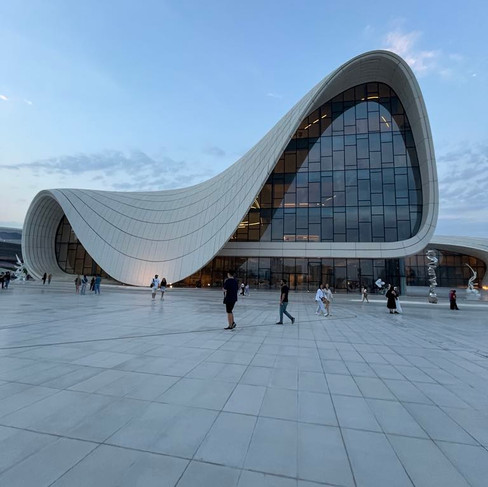Oil, Soviet State of Mind, and the Silk Road: Understanding the Private Investment Environment in Azerbaijan
- Trekking for Alpha

- Nov 11, 2024
- 6 min read
Baku, Azerbaijan is often referred to as "Dubai of the Caucasus". There are similarities between the two cities, but the differences are louder. They are both cities built on oil wealth, but Baku’s status as an oil rich land goes back much further. Marco Polo recorded oil fields near Baku in 1273 and the city was the site of the world's first industrial oil well built in 1846. Yes, there is ostentatious architecture in Baku (like the iconic Flame Towers and Zaha Hadid’s Heydar Aliyev Center) and clear signs of conspicuous consumption (luxury malls and flashy cars driving down the newly built roads all signal this), but its interestingly mixed amidst striking remnants of a recent Soviet past and signs of its position on the ancient Silk Road.
When all of this history and these disparate influences mix together, it creates an intriguing economic environment. Azerbaijan is juggling the benefits and the challenges that come with wealth from oil. It is also dealing with the cultural imprints on its citizens left by the Soviet Union. The government's main goal going forward is diversifying away from an oil-dependent economy. In order to successfully do this, the country must combat the lasting impressions left on its citizens by Stalin and the like.
Below, we discuss the current investment ecosystem in Azerbaijan and how the country is positioning itself for the future. Many insights are guided from input we gathered in conversation with Mukhtar Garayev, an Associate Investment Manager at Pasha Investments.
Heydar Aliyev Center Carpet Museum with Flame Towers in Background
PEVC Fund Landscape in Azerbaijan
There are two domestic private equity funds in Azerbaijan:
Pasha Investments: Pasha Investments is the only non-governmental private equity fund in Azerbaijan. Pasha Investments focuses on growth capital in mid-cap companies in Azerbaijan (main focus), Georgia, and Turkey. Pasha Investments is currently deploying capital from Fund III and invests across sectors. Pasha Investments is the private equity investment arm of Pasha Holdings, an Azerbaijani conglomerate and the largest company in Azerbaijan.
Azerbaijan Investment Company (“AIC”): AIC is a state-backed investment initiative deploying capital into the non-oil sector of Azerbaijan. Sector focus includes food processing, heavy industry, logistics, pharmaceuticals, agriculture, and production. Because the fund is backed by the government, social considerations are factored into the investment selection process.
The domestic VC ecosystem is small and nascent. Azerbaijan’s first VC fund, Caucasus Ventures, was founded in 2022. A second fund has since successfully fundraised to join them.
Caucasus Ventures: In 2022, Caucasus Ventures announced the successful raise of $6.6 million marking the establishment of Azerbaijan’s first VC fund. The capital will be deployed into 50 projects across the Caucasus region, Central Asia, Türkiye, and Eastern Europe.
~10% of Fund I will be deployed into other foreign venture funds (fund of funds)
Azerbaijan’s Innovation and Digital Development Agency (IDDA) and PASHA Holdings allocated $2.9 million. Individual entrepreneurs committed $760,000.
Sabah.Fund: In August 2024, Sabah.Fund announced its first close of $11 million. The fund aims to raise $25 million and is focused on technology startups across the Caucasus region, Central Asia, and culturally-similar markets in MENA.
The fund targets companies at the pre-seed and seed stages, with a primary focus on FinTech, CleanTech, Digital Health, and EdTech.
Backers to date include two state-owned entities (AIC and SOCAR, the oil major), high-net-worth individuals, family offices, and Azerbaijani companies.
Sabah.Fund launched in partnership with Sabah.Hub, a local startup innovation center to be discussed in a future post.
Beyond funds, there are family offices and other pools of capital supporting the investment environment. One example is Moonwake, a private company investing capital from families and individuals in Azerbaijan. Moonwake invests across PE, VC, and public markets in Azerbaijan and beyond. Examples of investments include Costa Coffee Azerbaijan, Azerbaijan Company for Poultry Development, and a commitment to Sabah.Fund.
Moonwake Office in Old Town Baku Baku Stock Exchange Office Pasha Investments
Why is the PEVC ecosystem in Azerbaijan smaller and less developed than other regional players like Georgia?
For starters, Azerbaijan is an oil rich nation and has had less of a need to develop a private capital market. Additionally, debt is relatively cheap (10-11% interest rates) and widely accessible. Finally, there are some cultural considerations which have inhibited growth – see below for details.
What makes you excited to be an investor in Azerbaijan?
End of the Nagorno-Karabakh Conflict Creates Opportunity: After decades of fighting, the Nagorno-Karabakh conflict ended on January 1, 2024. Instability from the conflict previously drove away foreign investor interest. With the conflict largely over and increased stability in the region, prospects for attracting foreign dollars are improving.
Low-Hanging Fruit from Lack of Business Sophistication: Historically, many companies operated informally, which concealed their true performance. Today, with more companies operating officially, there is a growing need for and opportunity for external financing and advisory services that will only continue to grow.
Azerbaijani Government Focused on Bolstering Investment Ecosystem: The 2014-2016 oil price plunge was the final writing on the wall for the Azerbaijani government – they needed to diversify the economy away from fossil fuels. Since this wake-up call, the government has implemented incentives to improve the investment environment.
Government targeted sectors to diversify the economy include: Agriculture, tourism, information and communications technology (ICT), and transportation/logistics
Oil and gas revenue accounts for 90%+ of export revenue and ~50% of the state budget
Strategic Location…. Between Iran and Russia: While Westerners view Azerbaijan’s location as between a rock and a hard place (aka Iran and Russia), local investors view its position along the historic Silk Road, facilitating trade between Europe and Asia, as a significant advantage. This strategic position creates opportunities for existing and new businesses. To fully capitalize on this advantageous location, investment in infrastructure is necessary to enhance profitability.
Additionally, amid rising geopolitical tensions, Azerbaijan has become an essential trade corridor between Russia and Iran. In May 2023, Russia and Iran agreed on a new rail corridor through Azerbaijan which will link Russia to ports on the Persian Gulf creating an access point to the Indian Ocean.
Silk Road Caravanserai in Sheki, Azerbaijan Baku Old Town with Flame Towers
Competition to Buy Assets is Very Low: Given the small size of the PEVC ecosystem, competition to buy assets is limited.
Trekking for Alpha views this as a double-edged sword as this also constrains exit options.
Energy Transition Opportunities: Azerbaijan is increasing renewable energy usage in a bid to export more oil and gas and transition away from reliance on fossil fuels. The government has announced plans to increase the share of renewables to 30%+ by 2030, up from ~21% today. Azerbaijan’s geographic location supports solar and wind opportunities… Fun fact: Baku is called the City of Winds as harsh winds are present year-round.
This year, Baku is hosting COP29, the UN’s premier climate conference. Opportunities and new initiatives are sprouting up ahead of this event.
Culture
USSR Mindset: While the Cold War ended decades ago, the Soviet-era mentality is still engrained. For starters, the concept of operational support from a PE partner is viewed as a negative intervention versus as a value creation mechanism. Additionally, there is skepticism around external investors. Lack of business formality is also a byproduct of this bygone era.
The Post-USSR generation of business leaders are likely to have a different mindset. This could lead to opportunity for investors to enter this market in the future.
Soviet-era truck and WW2 monument in Sheki, Azerbaijan
Business Owners Intimidated by IRR Expectations: Management teams are daunted by achieving the 25-30% IRR expectations set forth by PE investors.
Lack of Familiarity with PEVC and the Benefits that Come with It: Like in so many frontier economies, business leaders are not familiar with PEVC…. they are even scared of it. This creates hesitancy to engage with investors. Business leaders are also unfamiliar with the operational support and other benefits that come from a partnership with a PEVC fund. Significant education around the asset class is required to overcome this hurdle.
Sectors
Interesting sectors include energy transition, food production, logistics, and business services.
Sourcing
Sourcing is largely done through relationships, specifically with private bankers. Private bankers flag companies which have challenges attaining traditional bank financing and need alternative financing options such as private equity.
Exits
Exits mainly come in the form of management buybacks. Put options, an agreement to sell the company back to the former shareholder at an agreed upon price, are often layered into the term sheet. Sales to strategics occur but are less common. There has been very, very little interest from external investors or strategics.
Note: The Baku Stock Exchange is very small and illiquid. It is not viewed as a viable exit pathway.
Leverage
Leverage is not applied to portfolio companies at the time of investment as financing with favorable terms at this point is often not available. Leverage is frequently added during the hold period after operational improvements and financials are cleaned up. Additionally, banks are more willing to lend to a company backed by Pasha Investments / other institutional investors generally.





















Comments